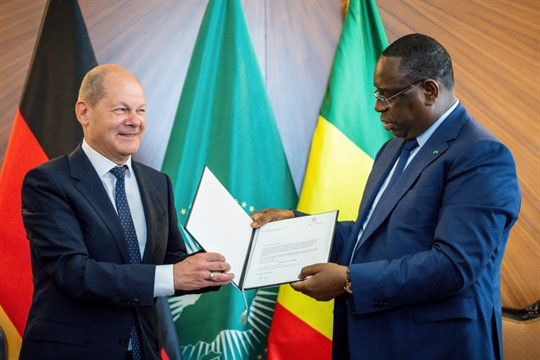German Chancellor Olaf Scholz made his inaugural visit to Africa with a three-nation tour that began in Senegal and concluded in South Africa. His trip came a little over three months after a visit by German President Frank-Walter Steinmeier was abruptly cut short by Russia’s invasion of Ukraine. The ongoing crisis there and its geopolitical ramifications—including for food and energy security, international security and the future of the international system more broadly—were prominent features of Scholz’s visit.
The salience of those issues is reflected in the countries on Scholz’s itinerary. Senegal is regarded as a regional pillar of stability and a key Western partner, and it currently holds the chairmanship of the African Union and is a new G-7 partner country. It is also home to the Greater Tortue Ahmeyim, an offshore liquefied natural gas project sitting on Senegal’s maritime border with Mauritania. Niger, a critical regional security partner and a major transit point for irregular migration across the Mediterranean, is set to become the linchpin of France’s counterterrorism mission in the Sahel. It also hosts about 200 German troops stationed there as part of Operation Gazelle, a European Union training mission. And South Africa, a continental heavyweight with Africa’s third-largest economy and a hydrogen industry that is becoming increasingly attractive to European countries, serves as a continental hub for many German companies. It has also arguably been the continent’s most prominent voice in recent years on key international issues ranging from vaccine equity and international climate finance to staking out common African stances on the war in Ukraine.

